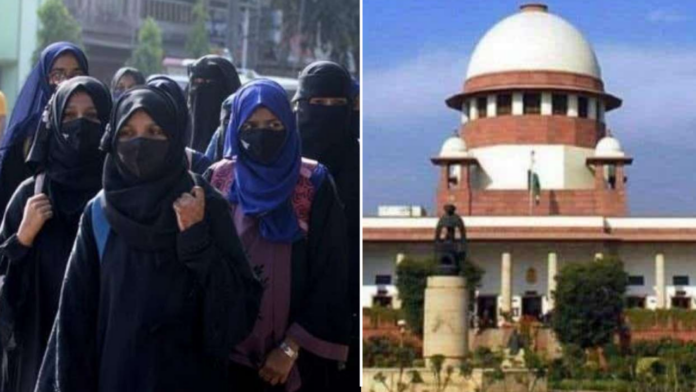A number of cases contesting the prohibition on the hijab at educational institutions in Karnataka were heard by the Supreme Court on Monday. On September 7, a bench composed of Justices Hemant Gupta and Sudhanshu Dhulia scheduled the case for additional hearing.
The applications were filed in response to a Karnataka High Court decision upholding a state government ruling allowing government college development committees to impose a hijab ban on campus. Justice Gupta requested senior attorney Sanjay Hegde to submit a comprehensive compilation shortly after the bench came together.
In response, Hegde stated that his petition had a compilation and had been initially filed after the HC verdict. Hegde, who represented the appellants and asserted the right to wear the hijab, said: “Can you tell a grown lady that she would not have authority over her own idea of modesty?”
Although it may be a religious practise, Justice Gupta questioned the senior attorney during Hegde’s presentation: “Can you wear hijab to a school where a uniform is required?”
When the SC turned to the Karnataka government to hear its arguments, Additional Solicitor General KM Natraj argued that “the sole issue is discipline at an institution and they don’t want to follow it.” When the bench questioned how the hijab was infringing the discipline of the institution, the ASG responded, “They cannot violate the school uniform code in the garb of religious rites being breached.”
When speaking on behalf of the state government, Advocate General P Navadgi said: “School administrators wrote to us seeking guidance since after wearing the hijab, pupils wore bhagwa shawls, which then caused turmoil in educational institutions. This is the context for the official order. The state was careful to avoid mandating any uniforms, but it left the door open for each institution to do so. Hijab is prohibited in some institutions. But the government is up against a battle. However, the government did not restrict any rights here. Only the institution rule was mentioned.
The state government was represented by Advocate General P Navadgi, who said: “School officials wrote to us seeking direction since after donning the hijab, students wore bhagwa shawls, which then generated chaos in educational institutions.
The official order is set forth in this context. Although the state took care to avoid imposing any universal requirements, it left the option open for each institution. Some institutions forbid the wearing of the hijab. However, the government is engaged in conflict. However, no rights were restricted in this instance by the government. There was just reference to the institution rule.
“Suppose there is a minority institution, may there be hijab,” Justice Dhuli questioned. “There might be”, the Advocate General said. We have left the responsibility to the institution. There may be Islamic management institutions in Karnataka that permit the hijab. Government intervention doesn’t exist.
The AG responded to the bench’s questioning about government-run institutions by stating that the college development committees would be responsible for making the decision.
Some have made decisions to forbid the hijab, such as the Udupi College, and such decisions are not being challenged here.
On August 29, the Supreme Court sent the Karnataka government notice on a number of petitions contesting the decision of the High Court upholding the state’s ban on the hijab at educational institutions.
The Karnataka High Court’s March 15 judgement has been contested by a number of these parties. The bench of Justices Hemant Gupta and Sudhanshu Dhulia has informed some of these parties that “forum shopping” is not permitted.
You may recall that on March 15, a full bench of the Karnataka High Court dismissed a number of applications submitted by Muslim females enrolled in pre-university institutes in Udupi who sought permission to cover their heads in the hijab in class.
According to the high court, wearing a headscarf is not a requirement for practising Islam, and reasonable restrictions may be placed on the freedom of religion guaranteed by Article 25 of the Constitution.






